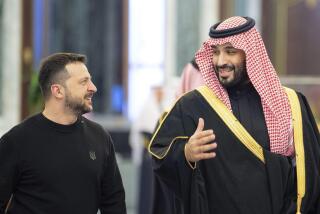Soviets Play Different Tune in Their New Campaign for a Role in Mideast Peace
- Share via
What a difference a decade makes. The last time a Soviet foreign minister traveled to the Middle East, his sole objective was to undermine the Arab-Israeli peace process. Now, ten years later, Moscow’s chief diplomat is helping to assemble a regional coalition in favor of a negotiated settlement.
Back in March, 1979, the only stop on Foreign Minister Andrei Gromyko’s itinerary was Syria, where he arrived bearing arms and support to bolster the Assad regime in its rejection of the approaching peace treaty between Egypt and Israel. This week, in stark contrast, Gromyko’s successor, Eduard I. Shevardnadze, is visiting Jordan, Egypt, Iraq and Iran in addition to Syria, which he wants to fall in line behind an emerging group of Arab parties that support peace talks with Israel.
The switch in Moscow’s policy represents no overnight conversion. For three years the Soviets have been struggling to apply the principles of Mikhail S. Gorbachev’s “new thinking” to the complexities of the Arab-Israeli conflict. And though it is constrained by intransigent local allies and the exigencies of traditional superpower rivalry, Soviet policy has gradually, though in an oftentimes halting fashion, begun to change in ways that favor a political settlement.
Thus there has been a significant upturn in relations with Israel to the point where the restoration of full diplomatic ties seems no longer a question of if, but when. Similarly, Moscow’s relations with traditionally pro-Western Arab states have improved. Today, tensions over the direction of the peace process are far more likely to result from disagreements with long-time friends in Syria and the Palestine Liberation Organization than with moderate leaders in Egypt and Jordan. Indicative of this change was Moscow’s policy toward the PLO late last year. Working with Egypt and against the expressed wishes of Syria, the Soviet Union played an important role in convincing Yasser Arafat to recognize Israel’s right to exist and renounce terrorism.
There is some reason to believe, therefore, that Shevardnadze is genuine in wanting to use his trip to “give new impetus to a Middle Eastern settlement.” At the same time, however, he clearly hopes to enhance Moscow’s claim to a central role in any future negotiations. In this sense, the timing of the visit is no accident. With the Bush Administration still in the throes of transition, and American strategy toward the Middle East clearly in flux, Shevardnadze’s high-profile tour aims to demonstrate the vitality and purpose of Soviet diplomacy in the region. Even more important, Moscow wants to preempt the United States’ Mideast agenda by confronting Washington with a joint Soviet-Arab approach to the peace process, one that focuses on an international conference with Soviet participation. This unified position would be presented to President Bush by Jordan’s King Hussein and Egypt’s President Hosni Mubarak during their visits to Washington this spring.
With or without “new thinking,” such efforts to strengthen the Soviet position in the Middle East should come as no surprise. After all, Moscow remains a great power with real interests and aspirations in the region. What is new and encouraging is that the Soviets increasingly seek to augment their influence through policies that bolster stability rather than undermine it, through policies that make Arab-Israeli negotiations more feasible rather than less. A willingness to publicly rebuke Syrian militarism, to align with moderate Arab positions on the peace process, and to help temper PLO rejectionism are all actions that should not be discounted too quickly.
Of course, significant differences continue to exist between Moscow and Washington on important questions. The Soviet view of an international conference with broad powers to effect a settlement remains unacceptable to the United States, as does Moscow’s insistence on an independent Palestinian state. But increasingly, with Soviet policy demonstrating new flexibility and pragmatism, these demands appear more as opening bargaining positions than as ultimatums. As such, they suggest that Washington should continue bilateral discussions with Moscow to explore ways in which the Soviets might contribute to an environment that is propitious for direct Arab-Israeli negotiations.
One complaint that must be registered about Shevardnadze’s itinerary is that it does not include Israel, arguably the most important player in the peace process. Moscow may insist that it is constrained by the objections of its Arab friends, but it remains a fact that the Soviet Union’s claim to a mediator’s role in negotiations will never be entirely credible so long as it fails to establish a normal working relationship with Israel. Everything suggests that this is only a matter of time. Still, Shevardnadze would be well advised to include an extra stop on his next trip. Next year, as the saying goes, in Jerusalem.
More to Read
Sign up for Essential California
The most important California stories and recommendations in your inbox every morning.
You may occasionally receive promotional content from the Los Angeles Times.













